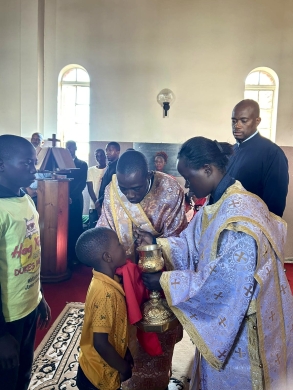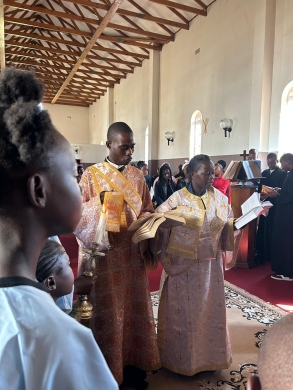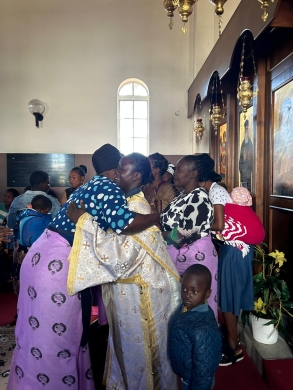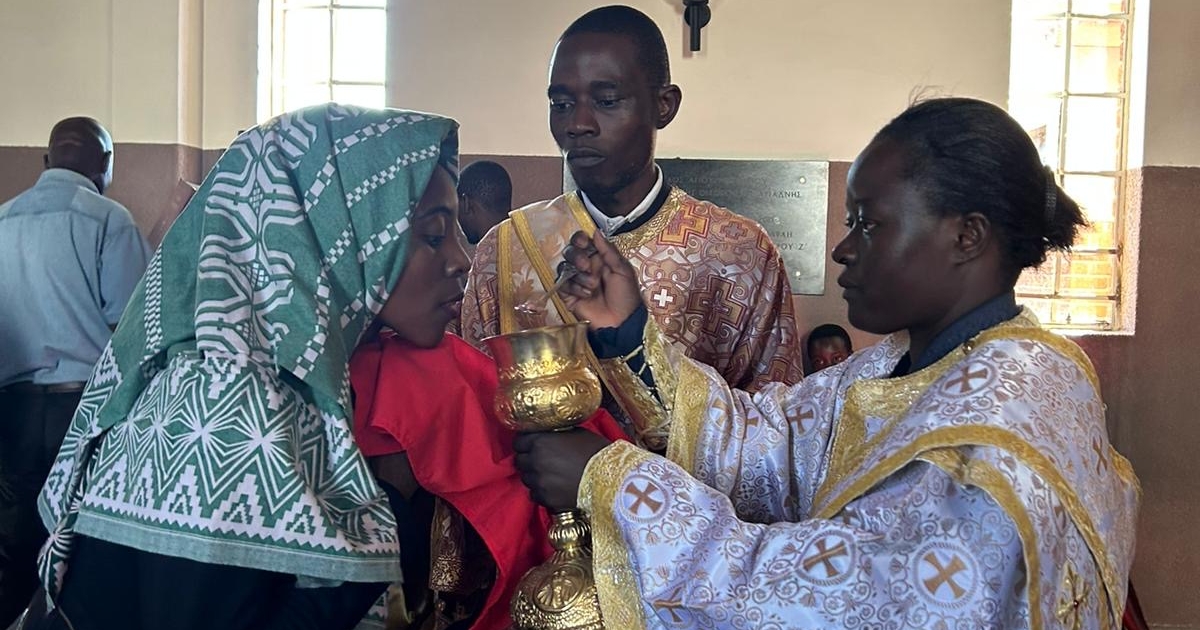Source: St. Phoebe Center for the Deaconess
Harare, Zimbabwe
On May 2, 2024, Holy Thursday, Angelic Molen of Harare, Zimbabwe, was ordained Deaconess Angelic in the Greek Orthodox Patriarchate of Alexandria and all Africa (the Orthodox Church in the continent of Africa) by His Eminence Metropolitan Serafim of Zimbabwe (Kykotis) in St. Nektarios Mission Parish at WaterFall. This historic event would not be possible without the approval and support of the Alexandrian Synod and His Beatitude Theodorus. The ordination of Deaconess Angelis was the culmination of efforts around the world to renew the ancient order of deaconesses in the Orthodox Church, and specifically for the unique needs of parishes in Africa.

Deaconess Angelic is a respected member of the Orthodox community of St. Nektarios Mission Parish. For years, she has worked to engage the Orthodox youth of Zimbabwe and build a foundation of pastoral care within her community. She has organized church school, mothers’s groups, and youth meetings. Deaconess Angelic is pursuing a university education in order to better serve as an ordained member of the Orthodox Church. She is studying Geography and Environmental Studies, placing the sanctity of the Earth at the forefront of her work. She said, “The Earth is a sacred gift from God. We must protect it from harm and live in harmony with the plants, animals, and every living thing.” She received special training on ecology and will oversee ecological initiatives for the network of parishes in Zimbabwe.
When asked how she felt about her ordination, Deaconess Angelic said, “At first, I was nervous about going into the altar, but when Metropolitan Serafim blessed me to enter the altar as part of my preparation this week, those feelings went away, and I felt comfortable. I am ready.” Deaconess Angelic also received a positive reaction from her community, saying that her parish, St. Nektarios, truly supports her, and she feels the Holy Spirit at work.
For the first thousand years of Christianity, the female diaconate flourished, with her duties based on the particular needs of the communities, including assisting with female baptisms, taking the Eucharist to the homebound and ill, education, administrative work, and other ministries primarily focused on women. Since 1855, numerous calls have been made to revive the female diaconate for the upbuilding of the Church.
The ordination of Deaconess Angelic in Zimbabwe was the fulfillment of the unanimous decision of the Holy Patriarchal Synod Greek Orthodox Patriarchate of Alexandria in 2016 to follow the Apostolic Tradition of the Orthodox Church to renew the ancient institution of deaconess for pastoral reasons. The decision of the Synod was in part based on the Rhodes Consultation as well as the 2016 Holy and Great Council’s affirmation of the ability of the local Church to minister to local pastoral needs. The Alexandrian Patriarchate in Africa felt the need to revive this order to serve the daily pastoral needs of Orthodox Christians in Africa.
Thus, the ordination of Deaconess Angelic for ministering to the unique needs of the Orthodox Churches in Africa marks a significant event in the modern world.
When asked about the role of Deaconess Angelic and future deaconesses in Africa, Metropolitan Serafim said she will have liturgical and pastoral roles. He said, “She is going to do what the deacon is doing in the Liturgy and in all the sacraments in our Orthodox services.” Her specific ministerial duties will address the particular needs of the parishes in Zimbabwe, as well.
In 2017, first steps were taken to renew the order of deaconesses in Africa when His Beatitude Theodoros II, Pope and Patriarch of Alexandria and All Africa, consecrated five women in the Democratic Republic of Congo. There is a distinction in the orders of clergy in the Orthodox Church between “minor orders,” which are consecrated positions, and “major orders,” which are ordained positions directly connected with the sacramental life of the church. Deaconess Angelic was ordained, which marks a return to the apostolic tradition of the institution of the diaconate.
 Metropolitan Serafim wrote, “One of the most important fields of work of the deaconess was the exercise of the works of love. They were the angels of mercy and the visiting sisters of the sick, the ‘grieving’ and poor women, imparting to them the gifts of Christian love. The deaconesses visited the imprisoned Christians, bringing them the offering.” He noted that the work of deaconesses today would not be identical to that exercised in Byzantine times; he says that nevertheless, “we must admit that women can offer the Orthodox Church a great missionary work,” and highlighted their missionary, catechetical, and teaching work.
Metropolitan Serafim wrote, “One of the most important fields of work of the deaconess was the exercise of the works of love. They were the angels of mercy and the visiting sisters of the sick, the ‘grieving’ and poor women, imparting to them the gifts of Christian love. The deaconesses visited the imprisoned Christians, bringing them the offering.” He noted that the work of deaconesses today would not be identical to that exercised in Byzantine times; he says that nevertheless, “we must admit that women can offer the Orthodox Church a great missionary work,” and highlighted their missionary, catechetical, and teaching work.
Holy Thursday was chosen by Metropolitan Serafim for this historic event because the Divine Liturgy served on this day commemorates the institution of the Holy Eucharist; thus, the ordination connects the work of the diaconate to the Eucharist.
Dr. Carrie Frederick Frost, the St. Phoebe Center for the Deaconess Board Chair (the nonprofit in the US dedicated to educating about and advocating for the revival of deaconesses) witnessed the ordination along with her daughter Annie. “I am honored to be with the Orthodox people of Zimbabwe, especially His Eminence Metropolitan Serafim and Deaconess Angelic on this historic occasion, and I am moved by their courage and foresight,” Dr. Frost stated. “This is not just an important event for the Orthodox community in Zimbabwe, but it will stand as an example and an inspiration to the rest of the Orthodox world to restore this vital ministry of deaconess.”
Photos by Annie Frost
Related Article
Orthodox Deaconess ordained by Metropolitan Seraphim of Zimbabwe – Peter Anderson
On Thursday, May 2, the day observed this year by the Orthodox as Holy Thursday, Mother Angelic Molen was ordained a deaconess by Metropolitan Seraphim (Kykkotis) of Zimbabwe in St. Nektarios Mission in Waterfalls (a suburb of Harare) with the approval and support of Patriarch Theodoros and the Holy Synod of the Patriarchate of Alexandria. The Facebook page of Metropolitan Seraphim has links to some of the articles covering this historic event. https://www.facebook.com/giorgos.iakovou/?locale=tl_PH&paipv=0&eav=AfY0GWe45YoXsPebdJZNYA6brxs3xiefJX235VujvlcAX4FmmGoU2SUH5mFwxeHqG0I&_rdr Dr. Carrie Frost, who is now the chairperson of the Board of the St. Phoebe Center for the Deaconess (a non-profits organization founded in the US and dedicated to educating about and advocating for the revival of deaconesses in the Orthodox Church) witnessed the ordination along with her daughter Annie. I have pasted below a photograph by Annie Frost showing Deaconess Angelic distributing communion to the faithful. It should be noted that some Local Orthodox Churches, such as the Moscow Patriarchate, do not even allow male deacons to distribute communion.
The following is an article about the event posted on the website of the St. Phoebe Center. https://orthodoxdeaconess.org/the-deaconess/contemporary-orthodox-deaconesses/bishop-ordains-orthodox-christian-woman-as-deaconess/ I found the most interesting report on the website of the Religion News Service (RNS): https://religionnews.com/2024/05/03/eastern-orthodox-church-ordains-zimbabwan-woman-as-its-first-deaconess/ This article states: “After unanimously voting to revive the female diaconate at its synod in Alexandria in 2016, the Patriarchate ordained six sub-deaconesses in the Democratic Republic of the Congo in 2017. Molen’s ordination as a full deaconess goes further. Her responsibilities, and those of future deaconesses, will include assisting priests in the liturgy and sacraments and addressing the specific needs of parishes in her country, explained Seraphim.”
This Orthodox event may have some effect on the Catholic Church. On October 28, 2023, the members of the XVI Ordinary General Assembly of the Synod of Bishops adopted a Synthesis Report. https://www.synod.va/en/news/a-synodal-church-in-mission.html The section of the Synthesis Report on “Women in the Life and Mission of the Church” provides in part as follows:
j) Different positions have been expressed regarding women’s access to the diaconal ministry. For some, this step would be unacceptable because they consider it a discontinuity with Tradition. For others, however, opening access for women to the diaconate would restore the practice of the Early Church. Others still, discern it as an appropriate and necessary response to the signs of the times, faithful to the Tradition, and one that would find an echo in the hearts of many who seek new energy and vitality in the Church. Some express concern that the request speaks of a worrying anthropological confusion, which, if granted, would marry the Church to the spirit of the age.
….
Proposals
….
n) Theological and pastoral research on the access of women to the diaconate should be continued, benefiting from consideration of the results of the commissions specially established by the Holy Father, and from the theological, historical and exegetical research already undertaken. If possible, the results of this research should be presented to the next Session of the Assembly.
At the second session of the Assembly to be held October 2-27, 2024, the proponents for the ordination of women to the diaconate will certainly stress this week’s event in Zimbabwe.
The RNS article quoted certain Orthodox experts that one should not expect this week’s ordination to significantly influence the other Local Orthodox Churches. I expect that the ordination will spark a strong reaction especially from more conservative Orthodox. I also believe that the ordination will be used by the Moscow Patriarchate’s Exarchate of Africa in its competition with the Patriarchate of Alexandria for priests and faithful in Africa. Moscow will argue that the ordination is just further evidence that the Patriarchate of Alexandria has separated itself from the Orthodox faith. In fact, Father Georgy Maximov, the chief missionary of the Exarchate, has already commented extensively on the ordination on his Telegram channel. https://t.me/s/OtecGeorgy Among his statements are the following: “I don’t know how the priests of the AOC [Alexandrian Orthodox Church] feel about this, but among our African priests (who converted to the Russian Orthodox Church) this causes indignation and rejection. Actually, they drew my attention to this ‘ordination,’ expressing the hope that we do not have such a thing. I assured them: no and never will be. This is modernism and a perversion of the Orthodox tradition. The fathers replied: another confirmation that we made the right choice by moving to the Russian Orthodox Church.”
Many of you will be celebrating the great feast of Pascha when you read this email. To all of you, I say: Christ has Risen!
Peter Anderson, Seattle USA
Related Video – Response from a Roman Catholic Perspective
African Orthodox Ordain Another Deaconess – Reason & Theology, Michael Lofton




